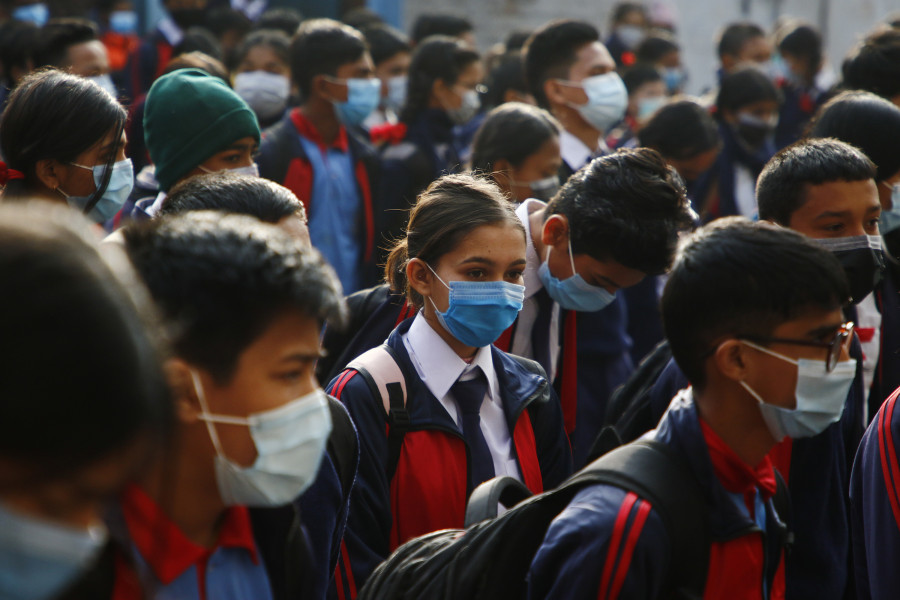Health
Covid-19 infecting more children, but government reluctant to close schools
Epidemiology and Disease Control Division says the UK variant B.1.1.7. might be responsible for over 60 percent of the new infections in Nepal.
Arjun Poudel
In the last 24-hours, 48 children under 20 years of age have tested positive for Covid-19. Of the 517 new cases, five are under 9 years old and 43 are between 10 and 19 years, according to the Ministry of Health.
“We have recommended that schools be closed for at least three weeks, but the government is not paying any heed to our recommendation,” an official at the Ministry of Health told the Post asking not to be named. “Students are dying in schools but the government is listening only to the suggestions of business people and school operators.”
So far, 46 persons under the age of 20 have died of the coronavirus infection.
Doctors say a sudden spike in new cases of coronavirus in densely populated areas of big cities suggests that a new variant of the Covid-19 has been circulating for months.
However, they say authorities concerned have neither taken necessary measures to contain the spread nor implemented the suggestions of experts, despite knowing that the new variant of virus is responsible for a surge in new cases.
“We have recommended a ban on gatherings in big cities including those in the Kathmandu Valley, Chitwan, Pokhara, Butwal and Birgunj, and that classes be conducted virtually,” Dr Krishna Prasad Paudel, director at the Epidemiology and Disease Control Division, told the Post. “We made the recommendations along with ample evidence, but they haven’t heeded.”
The division said the UK variant of the coronavirus known as B.1.1.7. might be responsible for over 60 percent of the new infections in Nepal.
According to scientists, the UK variant is 40 to 70 percent more transmissible than the one that caused the first wave of coronavirus infection. They have also said that the virus is 64 percent more deadly than the previous strains.
“Schools and academic institutions are becoming coronavirus hotspots in recent days,” Dr Samir Kumar Adhikari, joint spokesperson for the Ministry of Health, told the Post. “The Ministry of Health has been asking schools to stop in-person classes for a few weeks but other agencies responsible for implementing our recommendations appear unconvinced.”
Adhikari said that more schoolchildren might have been infected, as identifying infection in children is more difficult.
“When children exhibit symptoms, first of all people ignore it as normal influenza or common cold and do not rush to the hospital,” said Adhikari. “Secondly taking swab samples — throat and nasal swabs — from children is difficult because if such samples are not taken properly, polymerase chain reaction tests show negative.”
According to the ministry, four Covid deaths occurred in the last 24 hours. The number of active cases stand at 280,984. So far, the country has reported 3,058 deaths across the country due to Covid-19. Active cases stand at 3,608, according to the ministry.
“What can we expect from a government that listens more to businessmen than to experts,” an official at the Department of the Health Services said, asking not to be named. “This government has ignored the experts’ suggestions since the start of the pandemic so the second wave could be worse than the first wave.”
On Tuesday 5,203 tests were performed throughout the country. Despite growing risks of spread of new variants, authorities have not yet started active case finding and resumed contact tracing work, which doctors said are the only ways to stem the spread.
“What is alarming is that more people are dying at once, and young people and children are becoming seriously ill,” Dr Anup Bastola, spokesperson at the Sukraraj Tropical and Infectious Disease Hospital, told the Post. “Coming days will be more challenging and tough for us if we do not follow the safety measures.”
Doctors say even if we start following the safety measures, new cases will not lessen for a few weeks, as the virus might have already taken hold in communitie.
“It takes over two months for the infections to become widespread,” Dr Sher Bahadur Pun, chief of the Clinical Research Unit at Sukraraj Hospital, told the Post. “We should start case management, as more people could get serious and need hospitalisation, intensive care unit beds and ventilator support.”
The Ministry of Health said 97 infected people in serious conditions are receiving treatment at intensive care units and 20 others are on ventilator support across the country.
Meanwhile, the ministry said people who received their first dose of vaccine against Covid-19 in the first phase from January 27 to March 5 will be administered the second shot between April 20 and April 24.
As many as 438,000 people were inoculated in the first phase after the government launched its vaccination drive on January 27 with the 1 million doses of Covishield, the Oxford-AstraZeneca type vaccine manufactured by the Serum Institute of India, which the Indian government had provided to Nepal under grant assistance.
Likewise, the government is also preparing to administer the second dose of Covid-19 vaccine from to those who got vaccinated in the second phase, from May 16.
In the second phase of vaccination — from March 7 to March 15 — people above 65 years of age were inoculated. A little over 1.35 million people had taken the first dose during that period.




 13.12°C Kathmandu
13.12°C Kathmandu















